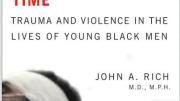Wrong Place, Wrong Time: Trauma and Violence in the Lives of Young Black Men, by John A. Rich, M.P.H. ’90 (Johns Hopkins, $24.95). The author, now a professor at Drexel University School of Public Health, offers a gritty, sobering view—sometimes from the blood-soaked ER—of epidemic shootings, stabbings, and street beatings.
Paleoclimates: Understanding Climate Change Past and Present, by Thomas M. Cronin, Ph.D. ’77 (Columbia, $95). Lest anyone doubt that there is science involved in assessing climate change, the author—a geologist associated with Georgetown University and the U.S. Geological Survey—delivers a dense text on the hard (rock) evidence.
The Ideological Origins of American Federalism by Alison L. LaCroix, Ph.D. ’07 (Harvard, $35). “Federalism is everywhere and nowhere in American legal and political history,” observes the author, a lawyer and historian now professing at University of Chicago Law School. Intrigued, she has sought out the ideas that resulted in a federalist government, before their inclusion in the Constitution.
A Vision for Venture Capital: Realizing the Promise of Global Venture Capital and Private Equity , by Peter A. Brooke ’52, M.B.A. ’54, with Daniel Penrice (University Press of New England, $29.95). A memoir of a life in finance by the founder of TA Associates and Advent International, who has his eye clearly on the economic value of investment, global growth, and a world untainted by excessive debt and quick-buck financial engineering.
Flawless, by Scott Andrew Selby, J.D. ’98, and Greg Campbell (Union Square, $24.95). A breathless “inside,” blow-by-blow, if not actually how-to, account of “the largest diamond heist in history” ($128 million)—in Antwerp, naturally, on Valentine’s Day weekend, of course.
The Upside of Turbulence, by Donald Sull ’85, M.B.A. ’92, D.B.A. ’96 (Harper Business, $27.99). A business-strategy book aimed at “seizing opportunity in an uncertain world” (prospective audience, these days: everyone), by a former Mc- Kinsey consultant, now a professor of strategy at the London Business School.
The Artist's Eyes: Vision and the History of Art, by Michael F. Marmor ’62, M.D. ’66, and James G. Ravin (Abrams, $40). A sort of forensic aesthetics, copiously illustrated, by a retina specialist and an art-minded fellow ophthalmologist, who interpret the eye and vision as seen through the works of, and by their effects on, Seurat, Matisse, Titian, Chuck Close, and others.
King of the Lobby, by Kathryn Allamong Jacob (Johns Hopkins, $40). The curator of manuscripts at Radcliffe’s Schlesinger Library provides a colorful look at Sam Ward, who parlayed good food, fine wine, and dinner conversation into power in Gilded Age Washington, D.C., pioneering the art of lobbying in a scandal-marred era.
Historic Photos of Harvard University, text and captions by Dana Bonstrom ’77 (Turner, $39.95). A gallery of black-and-white archival images, especially of buildings and architecture, from a panorama of pre-Business School Allston to Lowell House under construction to Churchill reviewing cadets in the Yard, and more.














